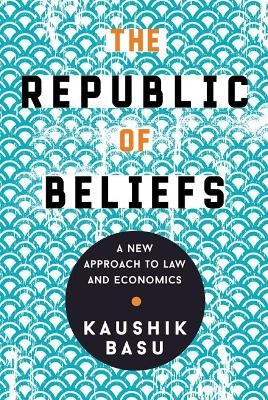
The Republic of Beliefs
A New Approach to Law and Economics
Seiten
2018
Princeton University Press (Verlag)
978-0-691-17768-7 (ISBN)
Princeton University Press (Verlag)
978-0-691-17768-7 (ISBN)
A leading economist offers a radically new approach to the economic analysis of the lawIn The Republic of Beliefs, Kaushik Basu, one of the world's leading economists, argues that the traditional economic analysis of the law has significant flaws and has failed to answer certain critical questions satisfactorily. Why are good laws drafted but n
A leading economist offers a radically new approach to the economic analysis of the law
In The Republic of Beliefs, Kaushik Basu, one of the world's leading economists, argues that the traditional economic analysis of the law has significant flaws and has failed to answer certain critical questions satisfactorily. Why are good laws drafted but never implemented? When laws are unenforced, is it a failure of the law or the enforcers? And, most important, considering that laws are simply words on paper, why are they effective? Basu offers a provocative alternative for how the relationship between economics and real-world law enforcement can be understood.
Basu summarizes standard, neoclassical law and economics before looking at the weaknesses underlying the discipline. Bringing modern game theory to bear, he develops a "focal point" approach, modeling not just the self-interested actions of the citizens who must follow laws but also the functionaries of the state—the politicians, judges, and bureaucrats—enforcing them. He demonstrates the connections between social norms and the law and shows how well-conceived ideas can change and benefit human behavior. For example, bribe givers and takers will collude when they are treated equally under the law. And in food support programs, vouchers should be given directly to the poor to prevent shop owners from selling subsidized rations on the open market. Basu provides a new paradigm for the ways that law and economics interact—a framework applicable to both less-developed countries and the developed world.
Highlighting the limits and capacities of law and economics, The Republic of Beliefs proposes a fresh way of thinking that will enable more effective laws and a fairer society.
A leading economist offers a radically new approach to the economic analysis of the law
In The Republic of Beliefs, Kaushik Basu, one of the world's leading economists, argues that the traditional economic analysis of the law has significant flaws and has failed to answer certain critical questions satisfactorily. Why are good laws drafted but never implemented? When laws are unenforced, is it a failure of the law or the enforcers? And, most important, considering that laws are simply words on paper, why are they effective? Basu offers a provocative alternative for how the relationship between economics and real-world law enforcement can be understood.
Basu summarizes standard, neoclassical law and economics before looking at the weaknesses underlying the discipline. Bringing modern game theory to bear, he develops a "focal point" approach, modeling not just the self-interested actions of the citizens who must follow laws but also the functionaries of the state—the politicians, judges, and bureaucrats—enforcing them. He demonstrates the connections between social norms and the law and shows how well-conceived ideas can change and benefit human behavior. For example, bribe givers and takers will collude when they are treated equally under the law. And in food support programs, vouchers should be given directly to the poor to prevent shop owners from selling subsidized rations on the open market. Basu provides a new paradigm for the ways that law and economics interact—a framework applicable to both less-developed countries and the developed world.
Highlighting the limits and capacities of law and economics, The Republic of Beliefs proposes a fresh way of thinking that will enable more effective laws and a fairer society.
Kaushik Basu is professor of economics and the Carl Marks Professor of International Studies at Cornell University. He was previously chief economist and senior vice president of the World Bank and chief economic advisor of the Government of India. His books include Beyond the Invisible Hand (Princeton) and Prelude to Political Economy.
| Erscheinungsdatum | 12.06.2018 |
|---|---|
| Zusatzinfo | 3 b/w illus., 13 tables |
| Verlagsort | New Jersey |
| Sprache | englisch |
| Maße | 155 x 235 mm |
| Themenwelt | Recht / Steuern ► Allgemeines / Lexika |
| Recht / Steuern ► EU / Internationales Recht | |
| Wirtschaft ► Allgemeines / Lexika | |
| Wirtschaft ► Volkswirtschaftslehre | |
| ISBN-10 | 0-691-17768-6 / 0691177686 |
| ISBN-13 | 978-0-691-17768-7 / 9780691177687 |
| Zustand | Neuware |
| Informationen gemäß Produktsicherheitsverordnung (GPSR) | |
| Haben Sie eine Frage zum Produkt? |
Mehr entdecken
aus dem Bereich
aus dem Bereich
Sammlung des Zivil-, Straf- und Verfahrensrechts, Rechtsstand: 14. …
Buch | Hardcover (2024)
C.H.Beck (Verlag)
CHF 53,20
Klausuren, Hausarbeiten, Seminare, Bachelor- und Masterarbeiten
Buch | Softcover (2021)
C.H.Beck (Verlag)
CHF 17,95


